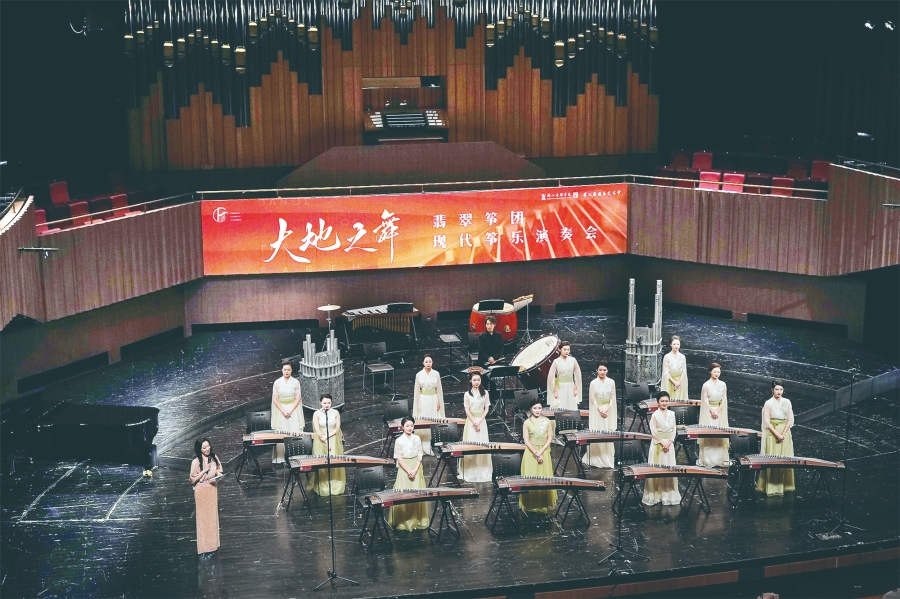Jade Zheng Group modern Zheng music concert to explore various possibilities of zheng music
Recently, the "Dance of the Earth -- Jade Zheng Group Modern Zheng Music Concert" hosted by Zhejiang Conservatory of Music and hosted by the Department of Traditional Music of Zhejiang Conservatory of Music was held in the Concert Hall of Zhejiang Conservatory of Music. This concert is the special concert of Zheng troupe in the 7th Guyue Art Festival of Zhejiang Conservatory of Music "Dale Yonghe".

At the beginning of the performance, Professor Sheng Yan, master tutor of Guzheng Department of Zhejiang Conservatory of Music and head of Jade Zheng Troupe, as the director of this concert, said that the purpose of this Guzheng Art Festival is to "explore the new development of Chinese national instrumental music in the new era", which coincides with the development idea of Jade Zheng troupe at the beginning of its establishment. The growth of Jade Zheng Group has always been based on the local zheng music culture of Zhejiang. In the years of exploration and development, it has not only continued to promote the traditional zheng music art of Zhejiang, but also insisted on innovation. In the process of moving forward, it has received the attention, support and help from many zither predecessors, theorists, musicians and composers.
During the concert that night, the Jade Zheng Group presented all new modern zheng music pieces, many of which were premieres. Star fantasy, mysterious dance, hymn of The Times, Dunhuang dream, the earth dancing, grassland listening to the wind... The concert venue not only let the audience experience the music style of modern works, but also through a variety of modern technical means such as stage lighting, electronic sound, theater layout, to create a rich and changeable mysterious artistic conception, and stimulate people's endless imagination. The new form and style of the performance attracted more than 800,000 viewers online.
The concert kicked off with a fast and dynamic guzheng quintet called Infinite Movement. Qin Fengda, the composer, adopts the music genre form of infinite movement. At the same time, according to the performance mode and phonological characteristics of the guzheng, he blends the tones of the national melody into the chord of the guzheng, and then develops it through modern composing techniques. The second piece is "Yi", a series of zheng songs for seven-tone string zither and piano, commissioned by young performer Dong Xinze and composer Chen Zhe. "Read the Stars", composed by young composer Wang Ser for four guzheng and electronic music, brings both visual and auditory enjoyment to the audience through the combination of the beautiful stage lighting effect, presenting a beautiful and mysterious fantasy of "read the stars, see what you want". "The Shadow Stealer", a multi-crossover guzheng work for three guzheng, erhu, percussion, dancers and tapes, is more to convey to the audience the alternative expression of national instrumental music in modern and contemporary times. Chang Tong-mun, a young composer, wants to see the performer as a reflection of the composer's thoughts, and the dancer and the mirror as a person and a shadow. This novel way of using guzheng to express causes the audience to think more deeply. Then, the guzheng version of "Green Lotus", composed by Professor Wang Yunfei from Zhejiang Conservatory of Music, unfolded slowly on the fingertips of Dong Jingyi, a member of the zheng troupe. The work is based on the design theme of Xiongan high-speed railway station "Green lotus dripping dew, Moisten Xiongan" as an opportunity to show the new appearance of The Times and sing the anthem of The Times.
The second half of the concert started with the work "LAN", which broke through the original stage performance form of the Guzheng. Inspired by the famous painting "Water Map" by the painter Ma Yuan of the Southern Song Dynasty, the young composer Wen Ziyang tried to express the mood of water with the guzheng. He focused his attention on "scraping", the most commonly used playing technique of the guzheng. The theater-style layout is adopted to expand the stage space, and the distance of the instrument code is adopted as a unique tuning method to explore the diversity and possibilities of contemporary zheng art in creation. By the young composer CAI Donghua created the Zhejiang premiere of the work "Dunhuang · Surprise dream" with music to describe the beautiful scene of Dunhuang, the use of variations of the roundabout style, adagio like the desert camel bell, allegro as if the flying fresco in the Hu swirl dance, passionate. That night, in the young performer Lou Lin's passionate interpretation, the live audience like immersive. The fourth movement of "Dance of the Earth" in "Ink Painting", a chamber music work composed by composer Liu Changchang for guzheng, bamboo flute and percussion, adopts a composite music style. Atonality, sequence music and pantonality mix and blend with Chinese classical music, highlighting the style of Chinese classical music in a unique and novel form, and showing the scene of dancing between man and the earth.
The last piece of the concert, "Green · Wind", was adapted from the folk orchestral suite "The Sum of the Colors" I -- "Green · Wind Song". With beautiful melody as the theme and Mongolian steppe as the background, the music vividly imitates the natural wind by imitating the special timbre such as Khomai and Morin khuur as well as the humming of the players.
This modern Zheng music concert is another bold breakthrough and attempt of Jade Zheng Group. In recent years, Jade Zheng Group has been making efforts to explore the contemporary innovation and development of guzheng. For three years in a row, Zheng Group has held the "Five Colors and Dazzling sounds of Zheng Music Works Workshop", and many of the premiere works in this concert are from this workshop. The workshop attracted more young composers to pay attention to the creation of guzheng works and explore more diversified forms of guzheng expression.
 渝公网安备 50010702504639号
渝公网安备 50010702504639号